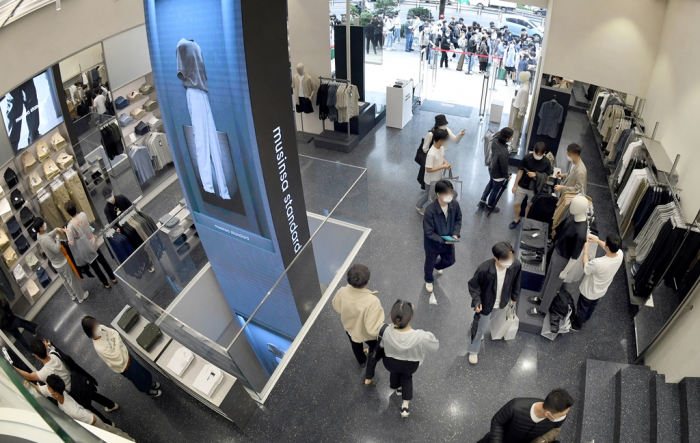
Musinsa’s offline store in Seoul South Korea’s top online fashion platform Musinsa withdrew a plan to acquire a local rival that focuses on Japanese shoppers.The move indicated that South Korean unicorns, startups with a valuation of more than $1 billion, began accumulating cash instead of expanding their businesses as rising interest rates dampened the initial public offering market, drying up liquidity in the venture industry, sources said.Musinsa has recently decided not to acquire Seoul-based Dholic Commerce Co., according to industry sources on Wednesday. The country’s top fashion app operator had been in the last stages of talks to buy Dholic from its founder and CEO Lee Dong-hwan, who holds an 86.63% stake, and venture capital firm We Ventures in order to start overseas businesses with the acquisition. Musinsa had negotiated to purchase the smaller rival with an agreement on its corporate value of around 100 billion won.“We had considered the takeover of Dholic for a foray into the Japanese market, but we decided not to proceed in the process of re-establishment of a strategy for Japan,” said a Musinsa source.CASH INSTEAD OF EXPANSIONDholic, which started as a small online shop back in 2001, expanded its presence in Japan with a localization strategy. Its gross merchandise value, or the total value of goods sold on its platform, reached 110 billion won ($87 million) a year as of 2020 with six offline clothing stores and eight cosmetics shops in Kyoto, Sapporo, Fukuoka and other Japanese cities. But the business tumbled on the COVID-19 pandemic.Musinsa had targeted Dholic to use it as a bridgehead for overseas business, an urgent task ahead of a planned listing next year. The leading domestic fashion platform had aimed to speed up expanding its presence in the global market by acquiring a player that has a presence in its target market, rather than starting from scratch.Musinsa’s withdrawal came as the investor sentiment in the local startup sectors rapidly soured, industry sources said. Prominent startups were expected to pile up cash instead of expanding their business portfolios with ample liquidity as uncertainties surrounding the macroeconomic conditions grew with rising interest rates and surging inflation, they said. The uncertainties also hurt the domestic IPO market that helps investors collect their investments and profits.By Jun-Ho Chachacha@hankyung.comJongwoo Cheon edited this article.
Most Read